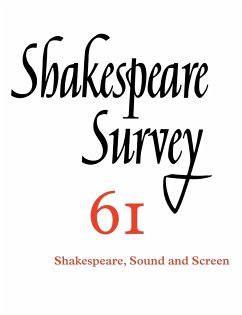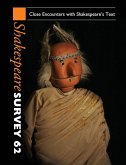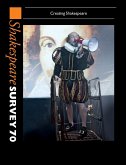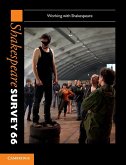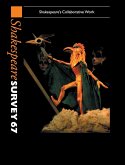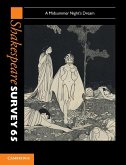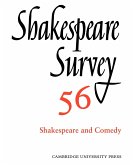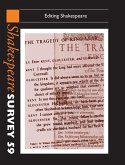Shakespeare Survey
Volume 61, Shakespeare, Sound and Screen
Herausgeber: Holland, Peter
Shakespeare Survey
Volume 61, Shakespeare, Sound and Screen
Herausgeber: Holland, Peter
- Broschiertes Buch
- Merkliste
- Auf die Merkliste
- Bewerten Bewerten
- Teilen
- Produkt teilen
- Produkterinnerung
- Produkterinnerung
Shakespeare Survey is a yearbook of Shakespeare studies and production. The theme for Shakespeare Survey 61 is 'Shakespeare, Sound and Screen'.
Andere Kunden interessierten sich auch für
![Shakespeare Survey Shakespeare Survey]() Shakespeare Survey41,99 €
Shakespeare Survey41,99 €![Shakespeare Survey 70 Shakespeare Survey 70]() Shakespeare Survey 7040,99 €
Shakespeare Survey 7040,99 €![Shakespeare Survey 66 Shakespeare Survey 66]() Shakespeare Survey 6640,99 €
Shakespeare Survey 6640,99 €![Shakespeare Survey 67 Shakespeare Survey 67]() Shakespeare Survey 67153,99 €
Shakespeare Survey 67153,99 €![Shakespeare Survey 65 Shakespeare Survey 65]() Shakespeare Survey 6543,99 €
Shakespeare Survey 6543,99 €![Shakespeare Survey Shakespeare Survey]() Shakespeare Survey65,99 €
Shakespeare Survey65,99 €![Shakespeare Survey Shakespeare Survey]() Peter Holland (ed.)Shakespeare Survey135,99 €
Peter Holland (ed.)Shakespeare Survey135,99 €-
-
-
Shakespeare Survey is a yearbook of Shakespeare studies and production. The theme for Shakespeare Survey 61 is 'Shakespeare, Sound and Screen'.
Hinweis: Dieser Artikel kann nur an eine deutsche Lieferadresse ausgeliefert werden.
Hinweis: Dieser Artikel kann nur an eine deutsche Lieferadresse ausgeliefert werden.
Produktdetails
- Produktdetails
- Verlag: Cambridge University Press
- Seitenzahl: 428
- Erscheinungstermin: 18. Juni 2014
- Englisch
- Abmessung: 246mm x 189mm x 23mm
- Gewicht: 823g
- ISBN-13: 9781107654808
- ISBN-10: 1107654807
- Artikelnr.: 41369158
- Herstellerkennzeichnung
- Libri GmbH
- Europaallee 1
- 36244 Bad Hersfeld
- gpsr@libri.de
- Verlag: Cambridge University Press
- Seitenzahl: 428
- Erscheinungstermin: 18. Juni 2014
- Englisch
- Abmessung: 246mm x 189mm x 23mm
- Gewicht: 823g
- ISBN-13: 9781107654808
- ISBN-10: 1107654807
- Artikelnr.: 41369158
- Herstellerkennzeichnung
- Libri GmbH
- Europaallee 1
- 36244 Bad Hersfeld
- gpsr@libri.de
1. Sarah Siddons, theatre voices and recorded memory Judith Pascoe; 2.
Playing with Shakespeare's play: Branagh's Love's Labour's Lost Anna K.
Nardo; 3. Bottom and the gramophone: media, class and comedy in Michael
Hoffman's A Midsummer Night's Dream Peter Donaldson; 4. Maurice Evans'
Richard II on stage, television and film Russell Jackson; 5. Richard II on
the screen Charles R. Forker; 6. 'Where lies your text?': Twelfth Night in
American sign language translation Peter Novak; 7. 'This uncivil and unjust
extent against thy peace': Tim Supple's Twelfth Night, or what violence
will Alfredo Michel Modenessi; 8. 'There's no such thing': nothing and
nakedness in Polanski's Macbeth Lindsey Scott; 9. Ghosts and mirrors: the
gaze in film Hamlets Simon J. Ryle; 10. 'It's a terrible thing to hate your
mother, Ben': mind control in Hamlet and The Manchurian Candidate Catherine
Grace Canino; 11. Channelling the ghosts: the Wooster Group's remediation
of the 1964 electronovision Hamlet Thomas Cartelli; 12. Listening to
Prospero's Books Evelyn Tribble; 13. Lend me your ears: sampling BBC Radio
Shakespeare Michael P. Jensen; 14. An age of kings and the 'normal
American' Patricia Lennox; 15. Shakespeare and British television Olwen
Terris; 16. A local habitation and a name: television and Shakespeare
Laurie Osborne; 17. Paying attention in Shakespeare parody: from Tom
Stoppard to YouTube Christy Desmet; 18. Madagascan Will: cinematic
Shakespeares/transnational exchanges Mark Thornton Burnett; 19. Still life?
anthropocentrism and the fly in Titus Andronicus and Volpone Charlotte
Scott; 20. Hamlet and its early sources Ian Felce; 21. 'Speak, that I may
see thee': Shakespeare characters and common words Hugh Craig; 22. Who do
the people love? Richard Levin; 23. A partial theory of original practice
Jeremy Lopez; 24. Shakespeare performances in England, 2007 Michael Dobson;
25. Professional Shakespeare productions in the British Isles,
January-December 2006 James Shaw; The year's contribution to Shakespeare
studies: 1. Critical studies Michael Taylor; 2. Shakespeare in performance
Emma Smith; 3. Editions and textual studies Eric Rasmussen and John Jowett.
Playing with Shakespeare's play: Branagh's Love's Labour's Lost Anna K.
Nardo; 3. Bottom and the gramophone: media, class and comedy in Michael
Hoffman's A Midsummer Night's Dream Peter Donaldson; 4. Maurice Evans'
Richard II on stage, television and film Russell Jackson; 5. Richard II on
the screen Charles R. Forker; 6. 'Where lies your text?': Twelfth Night in
American sign language translation Peter Novak; 7. 'This uncivil and unjust
extent against thy peace': Tim Supple's Twelfth Night, or what violence
will Alfredo Michel Modenessi; 8. 'There's no such thing': nothing and
nakedness in Polanski's Macbeth Lindsey Scott; 9. Ghosts and mirrors: the
gaze in film Hamlets Simon J. Ryle; 10. 'It's a terrible thing to hate your
mother, Ben': mind control in Hamlet and The Manchurian Candidate Catherine
Grace Canino; 11. Channelling the ghosts: the Wooster Group's remediation
of the 1964 electronovision Hamlet Thomas Cartelli; 12. Listening to
Prospero's Books Evelyn Tribble; 13. Lend me your ears: sampling BBC Radio
Shakespeare Michael P. Jensen; 14. An age of kings and the 'normal
American' Patricia Lennox; 15. Shakespeare and British television Olwen
Terris; 16. A local habitation and a name: television and Shakespeare
Laurie Osborne; 17. Paying attention in Shakespeare parody: from Tom
Stoppard to YouTube Christy Desmet; 18. Madagascan Will: cinematic
Shakespeares/transnational exchanges Mark Thornton Burnett; 19. Still life?
anthropocentrism and the fly in Titus Andronicus and Volpone Charlotte
Scott; 20. Hamlet and its early sources Ian Felce; 21. 'Speak, that I may
see thee': Shakespeare characters and common words Hugh Craig; 22. Who do
the people love? Richard Levin; 23. A partial theory of original practice
Jeremy Lopez; 24. Shakespeare performances in England, 2007 Michael Dobson;
25. Professional Shakespeare productions in the British Isles,
January-December 2006 James Shaw; The year's contribution to Shakespeare
studies: 1. Critical studies Michael Taylor; 2. Shakespeare in performance
Emma Smith; 3. Editions and textual studies Eric Rasmussen and John Jowett.
1. Sarah Siddons, theatre voices and recorded memory Judith Pascoe; 2.
Playing with Shakespeare's play: Branagh's Love's Labour's Lost Anna K.
Nardo; 3. Bottom and the gramophone: media, class and comedy in Michael
Hoffman's A Midsummer Night's Dream Peter Donaldson; 4. Maurice Evans'
Richard II on stage, television and film Russell Jackson; 5. Richard II on
the screen Charles R. Forker; 6. 'Where lies your text?': Twelfth Night in
American sign language translation Peter Novak; 7. 'This uncivil and unjust
extent against thy peace': Tim Supple's Twelfth Night, or what violence
will Alfredo Michel Modenessi; 8. 'There's no such thing': nothing and
nakedness in Polanski's Macbeth Lindsey Scott; 9. Ghosts and mirrors: the
gaze in film Hamlets Simon J. Ryle; 10. 'It's a terrible thing to hate your
mother, Ben': mind control in Hamlet and The Manchurian Candidate Catherine
Grace Canino; 11. Channelling the ghosts: the Wooster Group's remediation
of the 1964 electronovision Hamlet Thomas Cartelli; 12. Listening to
Prospero's Books Evelyn Tribble; 13. Lend me your ears: sampling BBC Radio
Shakespeare Michael P. Jensen; 14. An age of kings and the 'normal
American' Patricia Lennox; 15. Shakespeare and British television Olwen
Terris; 16. A local habitation and a name: television and Shakespeare
Laurie Osborne; 17. Paying attention in Shakespeare parody: from Tom
Stoppard to YouTube Christy Desmet; 18. Madagascan Will: cinematic
Shakespeares/transnational exchanges Mark Thornton Burnett; 19. Still life?
anthropocentrism and the fly in Titus Andronicus and Volpone Charlotte
Scott; 20. Hamlet and its early sources Ian Felce; 21. 'Speak, that I may
see thee': Shakespeare characters and common words Hugh Craig; 22. Who do
the people love? Richard Levin; 23. A partial theory of original practice
Jeremy Lopez; 24. Shakespeare performances in England, 2007 Michael Dobson;
25. Professional Shakespeare productions in the British Isles,
January-December 2006 James Shaw; The year's contribution to Shakespeare
studies: 1. Critical studies Michael Taylor; 2. Shakespeare in performance
Emma Smith; 3. Editions and textual studies Eric Rasmussen and John Jowett.
Playing with Shakespeare's play: Branagh's Love's Labour's Lost Anna K.
Nardo; 3. Bottom and the gramophone: media, class and comedy in Michael
Hoffman's A Midsummer Night's Dream Peter Donaldson; 4. Maurice Evans'
Richard II on stage, television and film Russell Jackson; 5. Richard II on
the screen Charles R. Forker; 6. 'Where lies your text?': Twelfth Night in
American sign language translation Peter Novak; 7. 'This uncivil and unjust
extent against thy peace': Tim Supple's Twelfth Night, or what violence
will Alfredo Michel Modenessi; 8. 'There's no such thing': nothing and
nakedness in Polanski's Macbeth Lindsey Scott; 9. Ghosts and mirrors: the
gaze in film Hamlets Simon J. Ryle; 10. 'It's a terrible thing to hate your
mother, Ben': mind control in Hamlet and The Manchurian Candidate Catherine
Grace Canino; 11. Channelling the ghosts: the Wooster Group's remediation
of the 1964 electronovision Hamlet Thomas Cartelli; 12. Listening to
Prospero's Books Evelyn Tribble; 13. Lend me your ears: sampling BBC Radio
Shakespeare Michael P. Jensen; 14. An age of kings and the 'normal
American' Patricia Lennox; 15. Shakespeare and British television Olwen
Terris; 16. A local habitation and a name: television and Shakespeare
Laurie Osborne; 17. Paying attention in Shakespeare parody: from Tom
Stoppard to YouTube Christy Desmet; 18. Madagascan Will: cinematic
Shakespeares/transnational exchanges Mark Thornton Burnett; 19. Still life?
anthropocentrism and the fly in Titus Andronicus and Volpone Charlotte
Scott; 20. Hamlet and its early sources Ian Felce; 21. 'Speak, that I may
see thee': Shakespeare characters and common words Hugh Craig; 22. Who do
the people love? Richard Levin; 23. A partial theory of original practice
Jeremy Lopez; 24. Shakespeare performances in England, 2007 Michael Dobson;
25. Professional Shakespeare productions in the British Isles,
January-December 2006 James Shaw; The year's contribution to Shakespeare
studies: 1. Critical studies Michael Taylor; 2. Shakespeare in performance
Emma Smith; 3. Editions and textual studies Eric Rasmussen and John Jowett.

